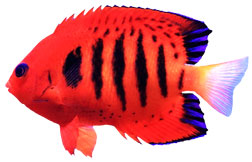 The nutritional requirements of fish have been intensively studied only in species of importance to aquaculture, with the goal of creating nutritionally complete, efficient, cost-effective feeds. When the findings of aquaculture research are applied to formulation of feed for marine aquarium fish, they may or may not be applicable. Approximately 200 species of marine fish are collected for aquariums. Many species feed on a relatively narrow range of natural prey, regardless of their ability to adapt successfully to artificial feed. Intense competition in the coral reef environment favors dietary specialization. Further, characteristics of the physical environment, water temperature, water quality, and the age and genetics of individual fish all influence dietary requirements. Given the range of species potentially available to marine aquarium enthusiasts, the varying degree of faithfulness to the natural environment across different aquarium habitats, and the largely unknown effects of interspecies interactions in confined spaces on the feeding behavior of individuals, it is impossible to specify a feeding regimen or an individual feed product that can be relied upon to satisfy all the nutritional requirements of any given collection of aquarium fish. The best advice to hobbyists remains, “Feed as wide a variety of foods, including dried, frozen, fresh and live foods, as your fish will accept, consistent with other aspects of proper marine aquarium maintenance.”
The nutritional requirements of fish have been intensively studied only in species of importance to aquaculture, with the goal of creating nutritionally complete, efficient, cost-effective feeds. When the findings of aquaculture research are applied to formulation of feed for marine aquarium fish, they may or may not be applicable. Approximately 200 species of marine fish are collected for aquariums. Many species feed on a relatively narrow range of natural prey, regardless of their ability to adapt successfully to artificial feed. Intense competition in the coral reef environment favors dietary specialization. Further, characteristics of the physical environment, water temperature, water quality, and the age and genetics of individual fish all influence dietary requirements. Given the range of species potentially available to marine aquarium enthusiasts, the varying degree of faithfulness to the natural environment across different aquarium habitats, and the largely unknown effects of interspecies interactions in confined spaces on the feeding behavior of individuals, it is impossible to specify a feeding regimen or an individual feed product that can be relied upon to satisfy all the nutritional requirements of any given collection of aquarium fish. The best advice to hobbyists remains, “Feed as wide a variety of foods, including dried, frozen, fresh and live foods, as your fish will accept, consistent with other aspects of proper marine aquarium maintenance.”
 With that stipulation in mind, it is nevertheless possible to identify some aspects of fish nutrition that appear to be common across multiple species.
With that stipulation in mind, it is nevertheless possible to identify some aspects of fish nutrition that appear to be common across multiple species.
Read More: CS Pro Flake Calanus & Spirulina Food
Protein to carbohydrate ratio Fish feeds must contain a higher percentage of protein, relative to carbohydrate content, than terrestrial animal feeds. This is due to the lower energy needs of fish, which in turn results from of their aquatic lifestyle, cold-bloodedness, and excretion of nitrogenous waste as ammonia. Research also demonstrates that fish are susceptible to hyperglycemia when fed excessive carbohydrates. Protein requirements are typically higher for:
- Marine fish
- Carnivores
- Smaller fish species or juveniles
- Fish living in high-density, recirculating systems
 CSPro Ingredients
CSPro Ingredients
- salmon fish meal-provides protein, essential amino acids, and lipids
- gluten flour-also known as “vital wheat gluten,” provides protein and essential amino acids
- soy flour-provides protein and essential amino acids
- brewer’s yeast-supplies protein, essential amino acids, and vitamins
- cornstarch-provides carbohydrates, aids in feed manufacture
- dried spirulina algae-supplies protein, essential amino acids, fatty acids and carbohydrate
- freeze dried plankton-provides protein, essential amino acids, and fatty acids
- freeze dried krill–provides protein, essential amino acids, and fatty acids
- dried kelp-supplies protein, essential amino acids, fatty acids and carbohydrate
- freeze dried Calanus-supplies protein, essential amino acids, and fatty acids
- fish oil-supplies fatty acids
- lecithin-interactive role in the absorption of cholesterol by the gut, thus enhancing growth
- garlic powder-boosts immunity and encourages feeding response
- earthworm powder-provides protein, essential amino acids, and vitamins
- vitamin A-fat soluble vitamin essential for fish health and disease resistance
- vitamin D-3-fat soluble vitamin essential for fish health
- biotin-water soluble vitamin essential for fish health
- methionine-an essential amino acid in limited supply from other feed components
- double-stabilized vitamin C-water soluble vitamin that boosts fish immune response; also protects lipid feed components from oxidation, thus increasing shelf life; stabilization with glutathione prolongs storage time with full activity
Read More: Planted Tanks with Fish: Simple Steps to Success
Nutritional Analysis of CSPro Flake- Crude Protein 45%-maximum protein content for optimal marine fish health
- Crude Fat 4%-recommended fat content for marine fish feed
- Crude Fiber 3%-means product is 97% digestible components
- Moisture 8%-low moisture content ensures long shelf life and nutrition/weight value for consumer
Contact SevenPorts
Need help or suggestions for fish feed? Take a look at the AquaLife brand’s product line, or please contact SevenPorts today for more info!




